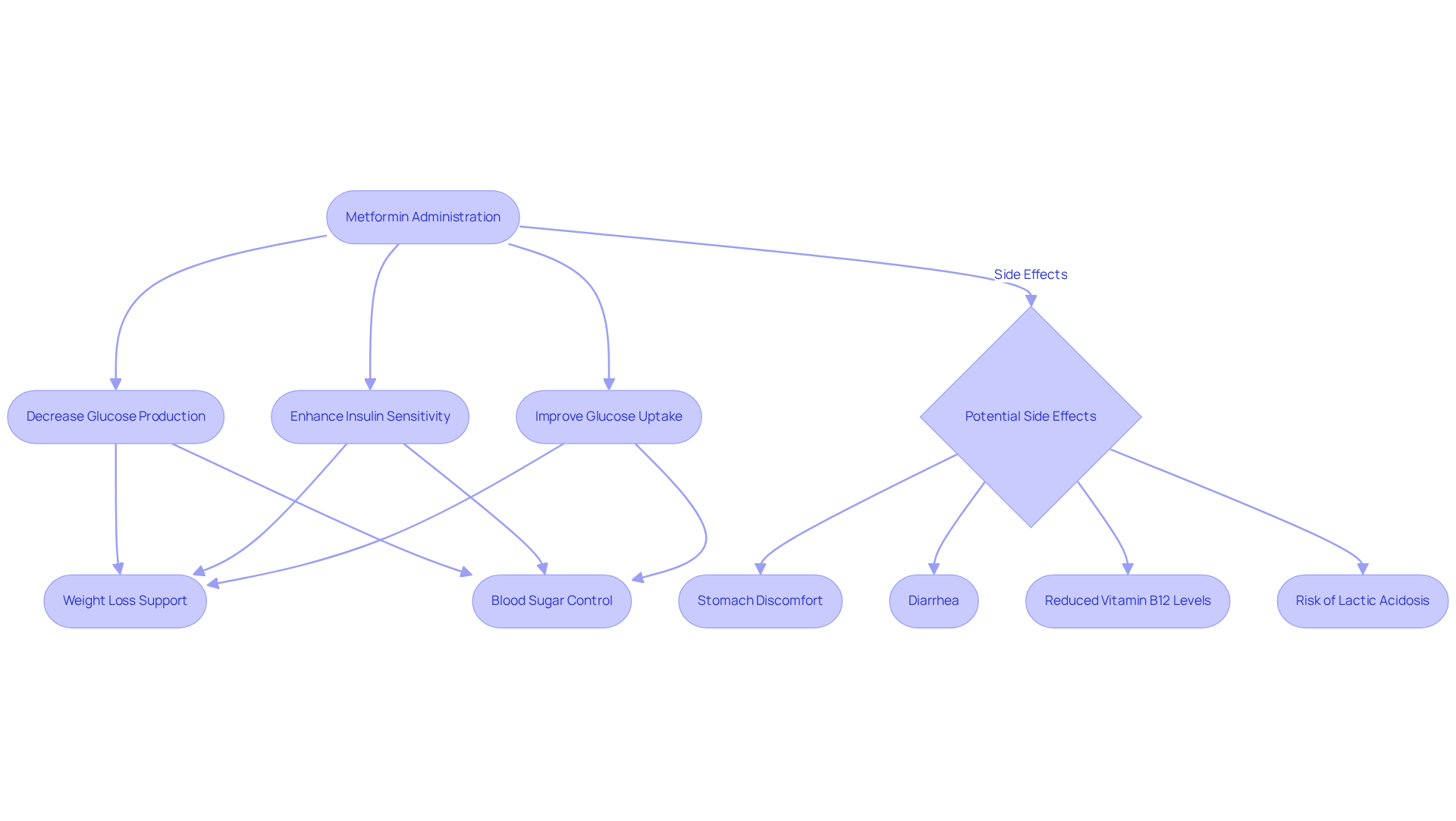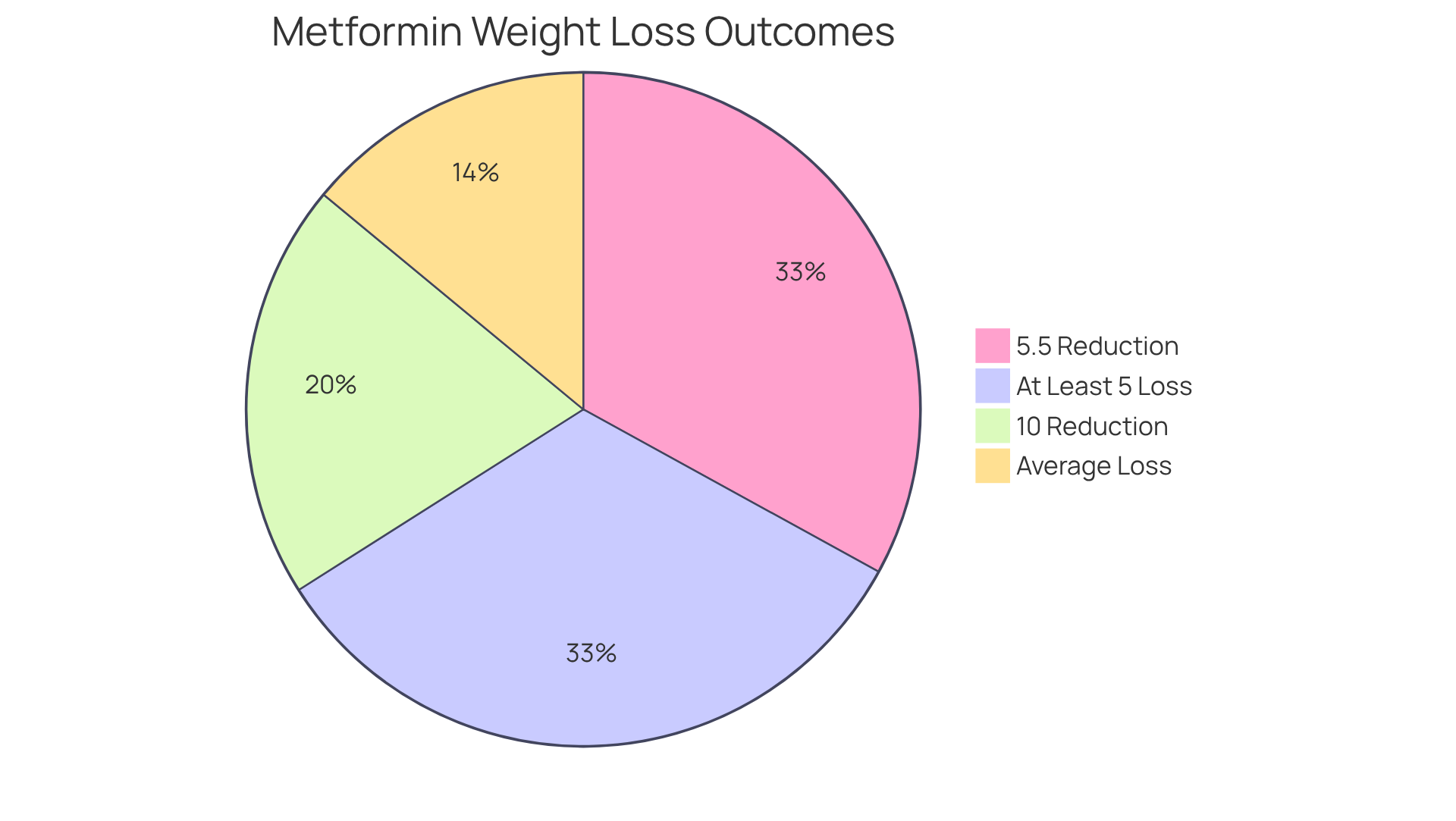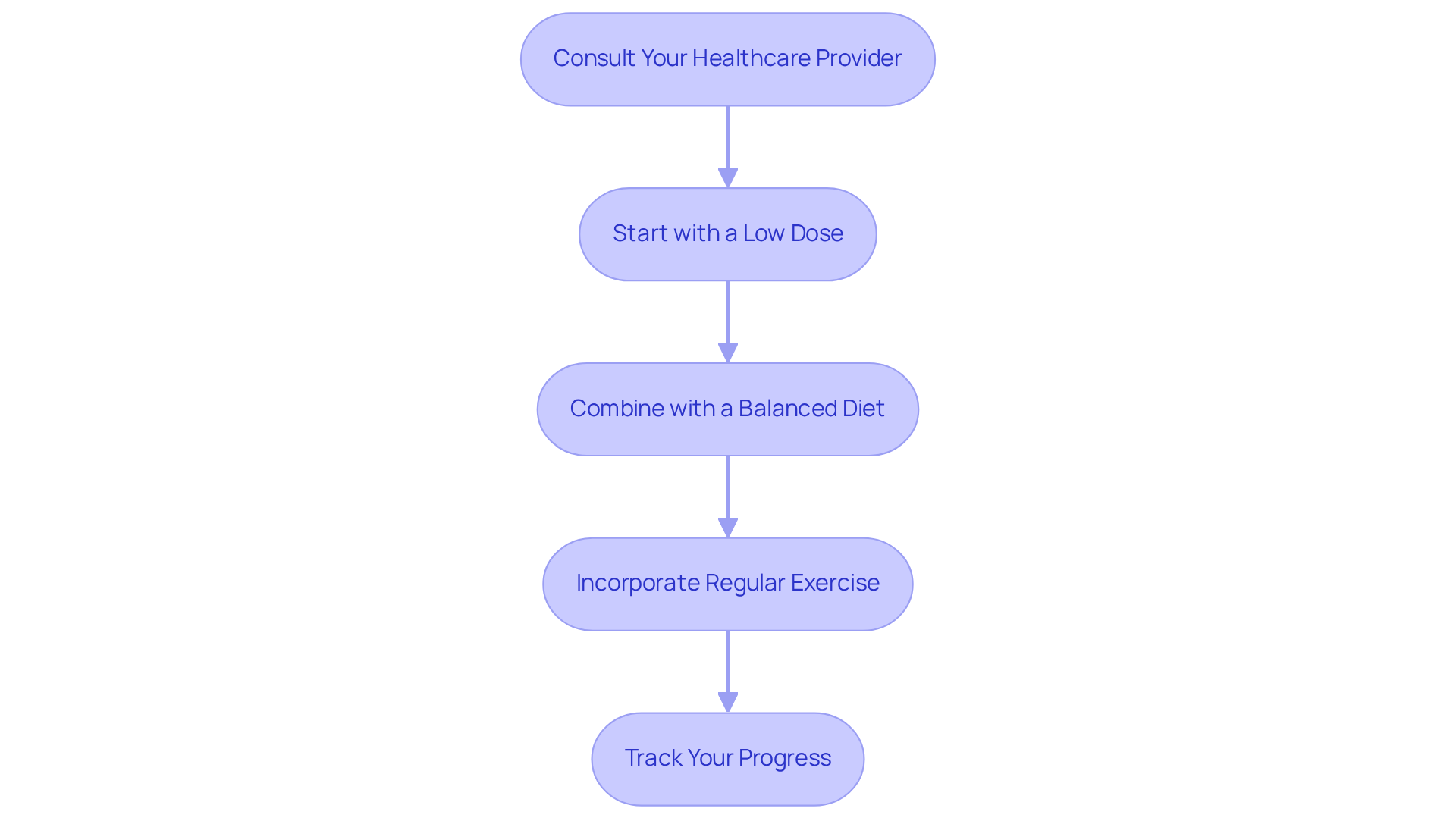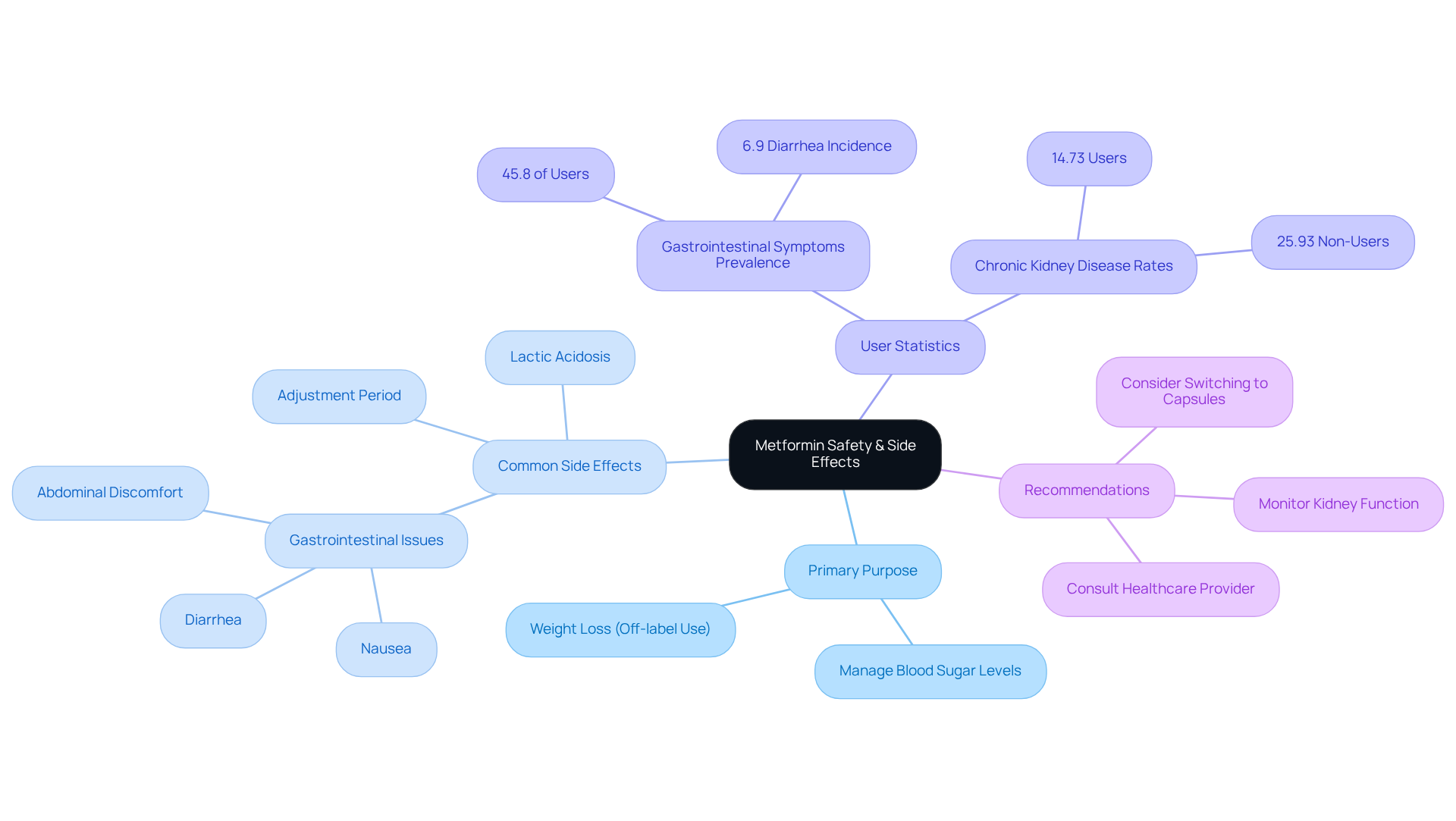Overview
If you’re feeling overwhelmed by your weight loss journey, know that you’re not alone. Metformin can be a helpful addition to your weight loss plan. It works by managing appetite and improving insulin sensitivity, which can lead to a moderate reduction in body mass. Research shows that users, especially those dealing with obesity or insulin resistance, have experienced an average weight loss of 5.5 to 10% when combining this medication with a balanced diet and regular exercise.
Imagine the possibilities: with the right support and a holistic approach, you can achieve your goals. Together, we can explore how Metformin might fit into your lifestyle, allowing you to take control of your health. Remember, every small step counts, and we’re here for you as you navigate this journey.
Embrace the idea that change is possible. By incorporating Metformin, you may find it easier to manage your appetite and see positive changes in your body. With a commitment to a healthier lifestyle, you’re already on the path to success. Let’s move forward together, one step at a time.
Introduction
Navigating the journey toward effective weight loss can often feel overwhelming. Many individuals find themselves exploring various medications, and metformin has emerged as a noteworthy option. Initially developed to help manage type 2 diabetes, this medication is now gaining attention for its potential to assist in weight reduction, especially for those facing challenges with insulin resistance. By delving into the mechanisms behind metformin’s weight loss effects, you may discover how this medication could become a supportive ally in your health journey.
However, it’s important to approach this option with care. What should you truly expect when considering metformin as part of your weight loss plan? With its benefits come crucial considerations regarding safety and potential side effects. Together, we can explore these aspects and empower you to make informed decisions on your path to achieving your goals.
Understand Metformin: Mechanism and Uses
This oral medication is primarily prescribed for managing type 2 diabetes, and it does so by decreasing glucose production in the liver, enhancing insulin sensitivity, and improving glucose uptake in muscle tissues. While its main purpose is diabetes control, many are intrigued by metformin weightloss and its potential benefits in reducing body mass, especially for those facing insulin resistance. Research suggests that metformin weightloss can contribute to a slight reduction in body mass, with studies demonstrating an average decrease of approximately 5.5 pounds over a year. Notably, individuals who increased their dosage by 1,000 mg or more experienced a significantly greater reduction in mass compared to those who maintained a stable dosage.
In a study involving 154 obese and overweight patients, the medication demonstrated an average reduction of 3.8 kg (approximately 8.4 lbs) over 29 weeks, emphasizing its effectiveness in metformin weightloss and body mass management. Additionally, its ability to control blood sugar levels and reduce cravings makes it easier for individuals to stick to a calorie-controlled diet. This is particularly beneficial for those dealing with insulin resistance, as metformin weightloss not only supports body mass reduction but also assists in stabilizing blood sugar levels, potentially slowing the progression of diabetes.
The mechanism behind metformin weightloss involves appetite suppression and changes in the gut microbiome, which may lead to decreased food consumption. A recent study also identified a molecule known as lac-phe, produced in greater amounts after exercise, linked to appetite regulation. Participants using the medication exhibited elevated lac-phe levels, suggesting a biochemical pathway that could enhance metformin weightloss effects on body mass reduction.
However, it’s essential to be aware of potential side effects associated with this medication. These may include:
- Stomach discomfort such as nausea or gas
- Possible diarrhea or loose stools
- Reduced vitamin B12 levels with long-term use
- A rare but serious risk of lactic acidosis if not used correctly
While this medication is not a miracle solution for weight loss, incorporating metformin weightloss into a comprehensive plan—along with a nutritious diet and consistent exercise—can offer significant advantages for individuals with insulin resistance and obesity. At Minimal, we’re here to provide tailored care and extensive support to assist you on your journey towards a healthier lifestyle, starting at just $99.99/month. Together, we can achieve your goals and foster a community of support.
Explore Metformin’s Benefits for Weight Loss
If you’re feeling overwhelmed on your weight loss journey, this medication may offer some help. It provides several benefits that can greatly enhance your fat reduction efforts, especially when metformin weightloss is incorporated into a comprehensive health framework tailored just for you. Notably, it has been linked to moderate reductions in body mass, particularly for those facing challenges like obesity or insulin resistance, which is often observed with metformin weightloss. In fact, studies show that individuals using metformin for weightloss can achieve an average reduction of 5.5 to 10% of their body mass over time. Remarkably, about one-third of those taking the drug for metformin weightloss manage to shed at least 5% of their body mass after a year.
This medication, metformin, is primarily recommended for conditions like type 2 diabetes and polycystic ovary syndrome (PCOS), which highlights its role in metformin weightloss during your journey. It works by suppressing appetite and reducing cravings, thus supporting metformin weightloss and making it easier to stick to healthier eating habits. Additionally, it improves metabolic health by lowering insulin levels and promoting fat oxidation, which can further assist in managing body composition effectively, especially with metformin weightloss.
By incorporating this medication into a comprehensive health improvement strategy that includes tailored fitness and nutrition advice, you can make significant strides towards lasting wellness advancements. Remember, you’re not alone in this journey; together, we can achieve your goals. This medication can be a valuable resource for anyone looking to achieve weight loss with metformin weightloss through a supportive and holistic approach.
Implement Metformin in Your Weight Loss Plan
To effectively incorporate Metformin into your weight loss plan, consider these supportive steps:
-
Consult Your Healthcare Provider: Start by discussing your weight loss goals and medical history with your healthcare provider. They will help determine if this medication, such as metformin weightloss, is suitable for you, especially considering its potential benefits for those with insulin resistance or metabolic syndrome.
-
Start with a Low Dose: If prescribed, begin with a low dose of the medication, usually around 500 mg once daily, to see how your body responds. Gradually increase the dosage of metformin for weightloss as advised by your healthcare provider, potentially reaching 1,500-2,000 mg per day if tolerated well, to enhance its effects on reducing body mass.
-
Combine with a Balanced Diet: To maximize the benefits of the medication, follow a balanced, calorie-controlled diet filled with whole foods, lean proteins, and healthy fats. This approach not only supports weight loss through metformin weightloss but also improves insulin sensitivity, which is crucial for achieving long-term success.
-
Incorporate Regular Exercise: Engage in consistent physical activity, including aerobic exercises and strength training, to boost your results while on the medication. Research shows that combining lifestyle changes with metformin weightloss can significantly enhance body mass management and metabolic health.
-
Track Your Progress: Regularly check in on your weight loss journey and any symptoms you experience. Schedule ongoing appointments with your healthcare provider to adjust your plan as needed, ensuring your approach remains effective and safe. Long-term studies indicate that continuous use of the medication, metformin for weight loss, along with lifestyle changes, can greatly reduce the risk of weight gain and enhance overall health outcomes. Remember, together, we can achieve your goals!
Assess Safety and Side Effects of Metformin
If you’re considering metformin weight loss medication to assist with weight loss, it’s important to feel secure in your choice. This medication is often seen as a safe option for many individuals aiming to reduce body mass. It works by helping to manage appetite, decreasing cravings for high-calorie foods, and lowering the body’s tendency to store fat. However, it’s essential to understand that this medication is not specifically FDA-approved for weight loss; its primary purpose is to help manage blood sugar levels in those with type 2 diabetes. Sometimes, healthcare providers may prescribe it off-label for weight loss in certain situations.
Many users report gastrointestinal issues, such as nausea, diarrhea, and abdominal discomfort, especially during the initial stages of treatment. Research shows that about 45.8% of users experience these symptoms, with diarrhea being the most common at 6.9%. The good news is that these symptoms usually lessen as your body adjusts to the medication. However, it’s worth noting that up to 20-30% of patients may face gastrointestinal adverse events that could lead to stopping the treatment, according to various studies.
In rare cases, this medication can cause lactic acidosis, a serious condition that poses a greater risk for individuals with impaired kidney function or other contraindications. It’s crucial to keep an eye on kidney function while taking this medication. Studies indicate that 25.93% of non-users have chronic kidney disease (CKD), compared to 14.73% of users. If you notice any unusual symptoms, please report them to your healthcare provider promptly to ensure safe and effective use of this medication.
Experts suggest that switching from diabetes medication tablets to capsules may significantly reduce gastrointestinal issues. One study even showed a 21.3% reduction in such symptoms after the transition. This highlights the importance of personalized treatment strategies to effectively manage any side effects you may encounter. Additionally, while this medication is generally considered safe during nursing, it’s always best to consult a healthcare professional. It should not be used for weight loss during pregnancy unless specifically prescribed.
In summary, while Metformin is an effective tool for metformin weight loss and diabetes management, understanding its side effects and safety considerations is vital for optimizing your health journey. Remember, we’re here for you, and together, we can achieve your goals.
Conclusion
Incorporating metformin into a weight loss plan can be a strategic approach for individuals grappling with obesity and insulin resistance. This medication, primarily used for managing type 2 diabetes, has shown potential in aiding weight loss by improving insulin sensitivity, reducing appetite, and stabilizing blood sugar levels. While it is not a standalone solution, metformin can play a significant role when integrated into a comprehensive health strategy that includes diet and exercise.
Have you ever felt overwhelmed by your weight loss journey? You’re not alone. The article outlines several key insights into the benefits and mechanisms of metformin for weight loss. It highlights studies indicating an average weight reduction of 5.5 to 10% for those on the medication, particularly among users who also engage in lifestyle changes. Additionally, the importance of consulting healthcare providers, starting with a low dose, and monitoring progress is emphasized, ensuring a safe and effective approach to using metformin for weight loss.
Ultimately, the journey towards weight loss and improved health is multifaceted. By understanding the role of metformin and implementing it alongside a balanced diet and regular exercise, individuals can enhance their chances of achieving lasting results. Remember, we’re here for you. As always, it is crucial to approach this journey with the support of healthcare professionals to navigate any potential side effects and ensure a personalized plan that aligns with individual health needs. Together, we can achieve your goals.
Frequently Asked Questions
What is the primary use of metformin?
Metformin is primarily prescribed for managing type 2 diabetes by decreasing glucose production in the liver, enhancing insulin sensitivity, and improving glucose uptake in muscle tissues.
Can metformin aid in weight loss?
Yes, metformin can contribute to weight loss, particularly for individuals facing insulin resistance. Research suggests that it can lead to an average reduction of approximately 5.5 pounds over a year.
How does metformin affect body mass?
In a study involving obese and overweight patients, metformin demonstrated an average reduction of 3.8 kg (approximately 8.4 lbs) over 29 weeks, highlighting its effectiveness in body mass management.
What mechanisms are involved in metformin’s weight loss effects?
The weight loss effects of metformin involve appetite suppression and changes in the gut microbiome, which may lead to decreased food consumption. It also raises levels of a molecule called lac-phe, linked to appetite regulation.
What are the potential side effects of metformin?
Potential side effects of metformin include stomach discomfort (such as nausea or gas), possible diarrhea or loose stools, reduced vitamin B12 levels with long-term use, and a rare but serious risk of lactic acidosis if not used correctly.
Is metformin a guaranteed solution for weight loss?
No, metformin is not a miracle solution for weight loss. It should be incorporated into a comprehensive plan that includes a nutritious diet and consistent exercise for significant advantages in managing weight.
How can individuals seeking help with weight loss and diabetes management access support?
Individuals can access tailored care and extensive support for their health journey, starting at just $99.99/month through services like Minimal.





















